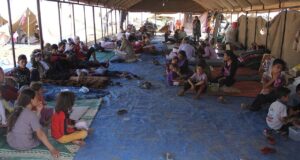By Julie Lenarz – Executive Director.
2nd September 2013, Human Rights and Conflict Resolution, Issue 3, No. 10.
Saudi Arabia is one of the world’s last absolute monarchies with an extremely arbitrary, reactionary and obscurantist justice system based on the most fundamental codification of Sharia law.
The kingdom’s medieval system of punishment includes chopping off the hands of thieves, flogging homosexuals, and beheading women for alleged adultery. The death penalty can also be carried out by stoning or firing squad followed by crucifixion.
In 2012, some 79 executions took place. One woman was beheaded for witchcraft and sorcery.
The country’s official murder and rape rates are one of the lowest in the world. The actual number, however, is far higher, and is corrupted by women and other minorities’ fear to report assaults committed against them.
The law is more often on the side of the aggressor than on the side of the victim, especially if the victim is not Saudi and male.
Foreign workers, in particular, have absolutely no protection or rights in the kingdom. At the moment, over 1.5 million female foreign maids live and work in Saudi Arabia, of which the majority is from Indonesia. Physical and mental abuse against them is not a rarity; it is a common practice. Many have had their passports taken away by their bosses. They are second class human beings – modern slaves – and are subject to random and unscrupulous attacks from their masters.
In 2010, an Indonesia maid was hospitalised after her boss burned her with an iron, cut off her lips with a pair of scissors and left her to die. Another maid was seriously injured by nails and other metal objects which were hammered into her body, after she complained about over-work.
Months later, Saudi Arabia beheaded a foreign worker and hanged her mutilated body from a helicopter as a warning to her colleagues.
According to Freedom House’sWorld Index, Saudi Arabia belongs to the ‘worst of the worst’ countries in the world.
Despite such an appalling human rights record, the kingdom is the West’s oldest and one of our closest allies in the Arab world.
This is our history. It is nothing to be proud of.
But what are the options on the table? Can we distance ourselves from the House of Saud? Should we encourage their overthrow if and when the Arab Spring hits the country? The brutal truth is that if the House of Saud were to fall, it would have serious repercussions for the West and several Middle Eastern countries, and would likely make the situation worse – even if that seems hard to imagine now.
The fall of the monarchy would touch upon central security and economic interests.
1. Iran: Saudi Arabia is the major counterbalance to Iran in the Arab world, especially since the end of the Saddam Hussein tyranny, and has contained its influence for decades. The demise of the House of Saud would considerably strengthen the regime in Teheran. While it is not an intelligent policy to control one dictatorship with another, as it is likely to result in a disaster in the long-term, it is of critical importance to take the consequences of that scenario into account.
2. Regional stability: At the same time, the fall of the monarchy would considerably weaken the sheikdoms of the Gulf and the Hashemite Empire of Jordan. The collapse of King Abdullah’s reign, in return, would put the peace with Israel at high risk and undermine the stability of the region even further, with Syria drowning in blood and Egypt ruled by the Muslim Brotherhood.
3. Oil: The oil for security pact between the US and Saudi Arabia was forged by President Roosevelt and Abd al-Aziz ibn Saud on board of the U.S.S. Quincy in 1945. Nowadays, the US retrieves only 8.1% of its oil from the kingdom, as it is one of the world’s largest oil producers itself. Close to 40% of its oil needs are met at home. Europe, however, is far more dependent on the oil supply from the kingdom and would be subject to another economic crisis, if that flow were to stop.
So, how likely is it that Saudi Arabia will be hit by the tidal wave of change that is sweeping across the region? At the moment, it seems unlikely, but possible, that the Arab Spring will have a major impact on the country. It cannot be ruled out, as the kingdom shares some of the key criteria with other countries affected by the revolutions. For example, it suffers from high unemployment among the youth, no freedom of expression, oppression of minorities (in the case of Saudi Arabia, the Shia minority), and gender apartheid.
The House of Saud is indeed concerned and troubled by that scenario. It has significantly increased its security budget, forged closer ties with allies through the Gulf Cooperation Council (Jordan and Morocco were invited to join), supported revolutions that weakened arch-enemy Iran, such as in Libya and Syria, and on the other hand, supported the embattled monarchy of Bahrain, and pumped millions of dollars into Jordan.
But what should be of uppermost concern for the West is the make-up of the opposition to the House of Saud. Although there are some secularist democrats and moderates, the strongest and best organised opposition faction by far, is that of the Wahhabis. They have been part of the establishment ever since the existence of the kingdom of Saudi Arabia, due to the alliance between the House of Saud and the clerics. That puts them into a privileged position and makes them the most likely successors to the monarchy.
Wahhabism is the most extreme form of Islamic fundamentalism prevalent in the Middle East and the origin of the radical ideology to which al-Qaeda is subscribed. Given Saudi Arabia’s immense wealth and largest oil reserves in the world, they could spread terror not only across the entire region but the entire planet.
Where does is leave us? Saudi Arabia remains the most complicated case in the Arab World for Western policy-makers. There is no easy way out of our moral dilemma. Tony Blair once said that if one cannot solve a problem, one has to manage it. As we cannot solve the Saudi problem, the best chance we have is to manage it by continuing to put pressure on the monarchy to engage in genuine reform.
Some steps into the right direction have already been taken; women were allowed to represent the country in the Olympics, and last week the king announced that from now on women can join the national assembly. We should be under no illusion, however, that progress in Saudi Arabia will be anything but painfully slow, and there will be many setbacks still to come.
The Saudi dilemma will stay with us for the foreseeable future, but while the West cannot fix the problem, it can at least apply pressure to make a bad situation better.
Julie Lenarz is contactable at:
Julie.Lenarz@hscentre.org
Please cite this article as:
Lenarz, J. (2013) ‘Saudi Arabia: Human Rights & Western Dilemma’. Human Security Centre, Human Rights and Conflict Resolution, Issue 3, No. 10.
 Human Security Centre Human Rights and International Security Research
Human Security Centre Human Rights and International Security Research




